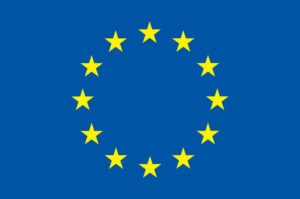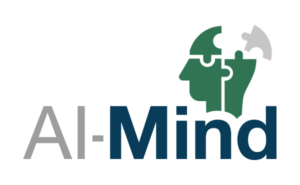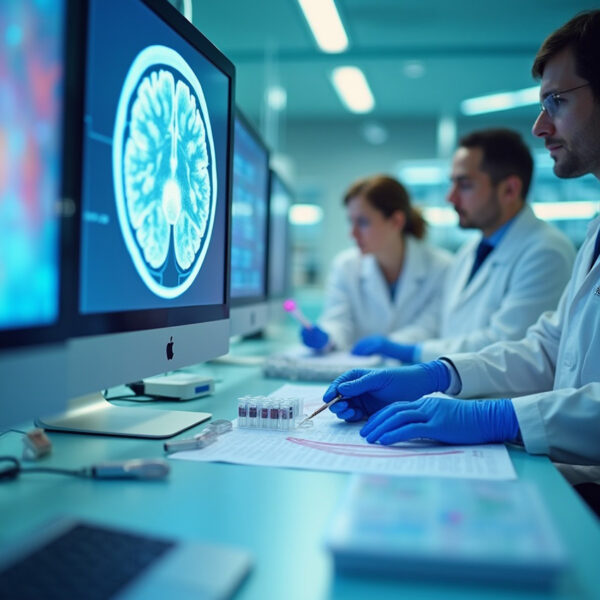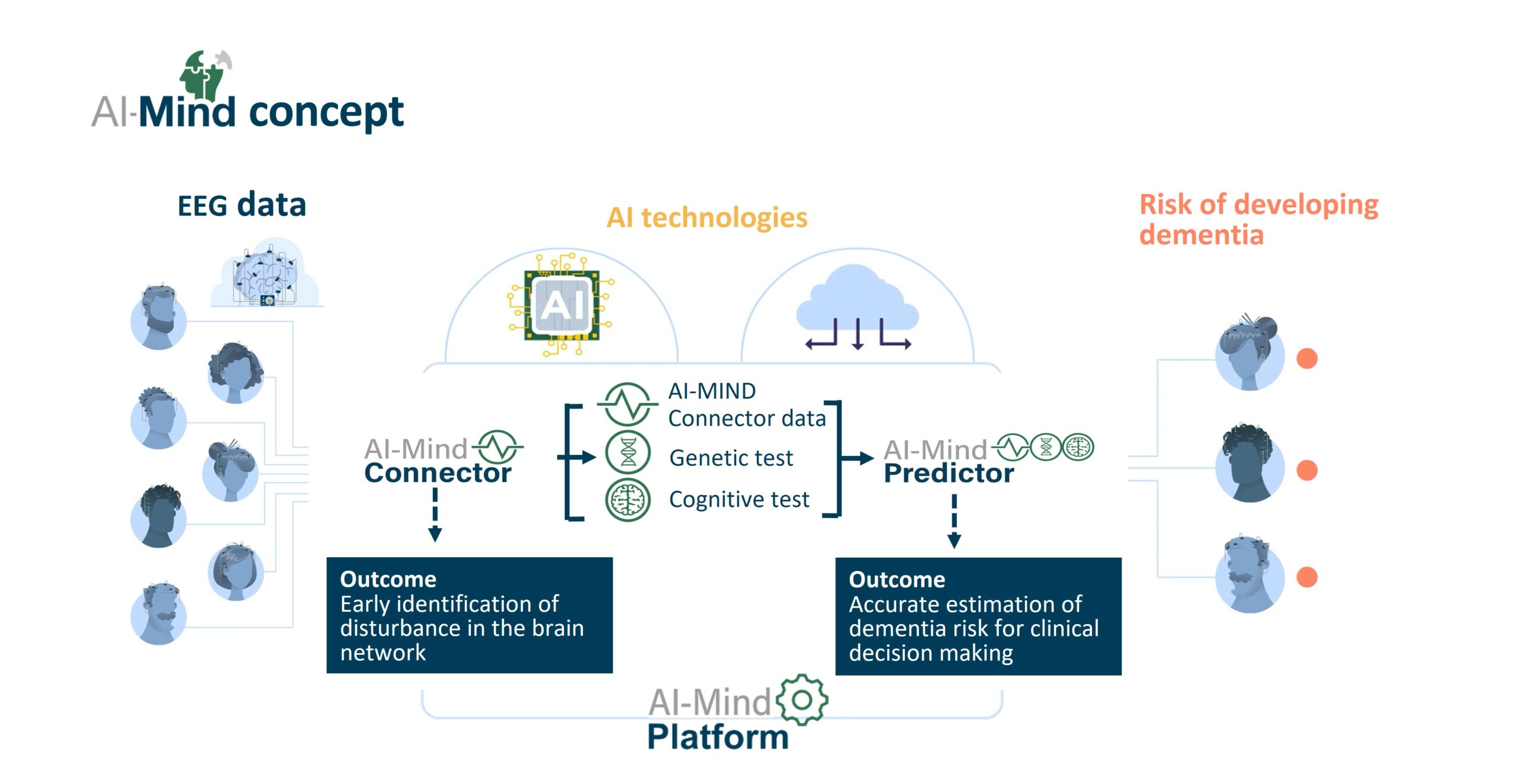From Foundation to Future: AI-Mind Strengthens Clinical Implementation
The updated consortium structure, implemented in January 2024, reflects AI-Mind’s evolving priorities (read recent news). New partners, namely the University of Oslo (UiO) and two industrial ones: Pre Diagnostics AS and Roche, have joined the project, bringing essential capabilities in biomarker development, clinical diagnostics and technology scaling. With this change, AI-Mind has entered a final phase marked by a strategic focus: accelerating the clinical validation and potential deployment of its AI-based tools for dementia risk estimation for people with mild cognitive impairment (MCI). With the project now progressing towards its conclusion in February 2026, this next chapter aims to ensure that AI-Mind’s technological breakthroughs are not only scientifically validated but also accessible, sustainable and impactful within the healthcare ecosystem.
Creating smart solutions: using study participant data to shape AI-Mind tools
At the heart of AI-Mind’s vision are two core innovations: the AI-Mind Connector, which identifies abnormal brain network activity, and the AI-Mind Predictor, which assesses individual dementia risk by combining data from brain scans, cognitive assessments, and genetic biomarkers. To bolster this effort, Pre Diagnostics AS, an innovative SME specialising in fluid dementia biomarkers, has joined the AI-Mind consortium to contribute to specific blood analyses (pTau217) on samples collected from 1.000 study participants. The detailed blood analysis plays a role in ensuring the accuracy of the models developed within the project. This collaboration not only presents opportunities for further development of Pre Diagnostic’s intracellular (monocyte) diagnostic test for Alzheimer’s disease (AD) but also for the development of new blood tests that can predict and monitor the severe side effects of the latest Alzheimer’s treatments.

Joining the AI-Mind consortium offers a unique opportunity for Pre Diagnostics in several ways. Our main task in this project, employing state-of-the-art biomarkers, represents an international kick-start for our Oslo-based Neuro service laboratory for dementia diagnostics. The AI-Mind partnership will facilitate further development and validation of our innovative services, such as fluid biomarkers for AD diagnosis and monitoring, as well as biomarkers to predict personalised response to new disease-modifying therapies for AD, like lecanemab and donanemab. With AI-Mind, Pre Diagnostics has become part of a broad international network of researchers and industrial partners. – says Dr Erik Christensen, Chief Medical Officer and co-founder of Pre Diagnostics.
AI-Mind concept and online platform
Both AI-Mind tools, aiming to support clinicians in detecting early signs of neurodegenerative changes, will be made available through a digital platform, designed with a user-centric approach to integrate seamlessly into routine clinical workflows.
To support the project’s data infrastructure needs, the University of Oslo (UiO) provides its Services for Sensitive Data (TSD). Here, all of AI-Mind’s sensitive data is securely stored for processing and analysis. This facilitates the secure upload and storage of sensitive data collected by AI-Mind researchers from the study participants, including socio-demographic information, EEG/MEG data and biomarker data. Additionally, UiO provides consortium-wide technical coordination management, led by Dr. Ainar Drews, as well as IT expertise. UiO will also administer the AI-Mind platform once it is fully deployed. UiO additionally strengthens informal ties to the EBRAINS collaboration, since several groups at UiO are involved in the EBRAINS project. The project aims not only to collect standardised data but also to validate and refine the AI-Mind Connector and AI-Mind Predictor tools within a clinical setting. This real-life validation will facilitate the Health Technology Assessment (HTA) and expedite the implementation of the AI-Mind solution as a decision-making tool within the European healthcare sector. The seamless integration of these tools into clinical practice holds promise for advancing dementia research and improving patient outcomes.
Pharma industry collaboration: AI-Mind’s role in advancing dementia research
The well-established pharmaceutical industries serve as benchmarks in the medical market, providing not only the capacities and infrastructure but also instilling confidence in consumers and investors. This foundation is vital for advancing research in dementia and other neurodegenerative diseases for the benefit of patients. The growing interest in AI-Mind within the pharmaceutical industry, driven by the absence of successful solutions for neurodegenerative diseases over many years, paves the way for collaborative efforts to address the societal and health challenges posed by dementia. AI-Mind envisions providing new opportunities for pharmaceutical Research and Development (R&D) to formulate drugs capable of addressing neuronal synchronicity before structural changes occur. Roche, the world’s largest biotechnology company and the global leader in in-vitro diagnostics has joined the AI-Mind consortium. Roche is known for its leading NeuroToolKit assays, including the P-tau (181) analysis, and will support blood analysis of samples collected within the AI-Mind study, ensuring cross-validation against the published literature. In blood analysis, measuring P-tau (181) levels serves as a biomarker for assessing tau pathology. Elevated levels of phosphorylated tau in the blood can indicate potential neurodegenerative changes, especially in diseases like Alzheimer’s. This biomarker offers valuable insights for researchers and clinicians, aiding in the understanding of the presence and progression of tau-related brain abnormalities. Furthermore, the company brings its expertise in EEG and machine learning (ML) to contribute to the successful and sustainable development of AI-Mind tools. Roche leverages real-world industrialisation experience and economic HTA insights to estimate further development costs and evaluate them against state-of-the-art diagnostics. This collaboration signifies a significant step towards advancing innovative solutions for neurodegenerative diseases.
Continuous commitment to public health
As AI-Mind enters its final stretch, its mission remains unchanged: to support early dementia diagnosis and reduce the burden of neurodegenerative diseases across Europe and globally. By combining cutting-edge science, cross-sector collaboration, and real-world readiness, AI-Mind partners are on course to deliver a lasting contribution to brain health innovation.
To learn more about the project, research, technology, study and our objectives, explore the AI-Mind website and stay tuned for updates through our social media channels.



